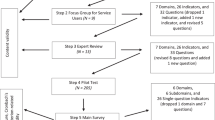Abstract
Social support systems can have either a beneficial or adverse effect when a family faces stress. Hence, support perceived by family members is an important construct. We studied the psychometric properties of the Family Support Scale (FSS) with a sample of 244 low-income families of children in a Head Start program, and we conducted an exploratory factor analysis with the scale. We obtained a 5-factor solution for the FSS when assessing the family support of low-income families. The internal consistency and test-retest reliability were moderately high for the 5 proposed subscales. The factor structure obtained may prove more valid for Head Start families than structures from previous studies, although there is still a need for further psychometric study of the FSS.
Similar content being viewed by others
REFERENCES
Anastasi, A. (1988). Psychological testing. New York: MacMillan.
Cohen, S., & Willis, T. A. (1985). Stress, social support, and the buffering hypothesis. Psychological Bulletin, 98, 310-357.
D'École, A. (1988) Single mothers: Stress, coping and social support. Journal of Community Psychology, 16, 41-54.
Dixon, G. H. (1980). Child development in the family health care center. Young Children, 35, 49-56.
Dubrow, N. F., & Garbadino, J. (1989). Living in the war zone: Mothers and young children in a public housing development. Child Welfare, 68, 3-20.
Dunst, C. J. (1985). Rethinking early intervention. Analysis and Intervention in Developmental Disabilities, 5, 165-201.
Dunst, C. J., Jenkins, V., & Trivette, C. M. (1984). The Family Support Scale: Reliability and validity. Journal of Individual, Family and Community Wellness, 1, 45-52.
Dunst, C. J., Jenkins, V., & Trivette, C. M. (1988). Family Support Scale. In C. J. Dunst, C. M. Trivette, and A. G. Deal (Eds.), Enabling and empowering families: Principles and guidelines for practice (pp. 153-174). Cambridge, MA: Brookline Books.
Dunst, C. J., & Trivette, C. M. (1986). Family Support Scale: Supplemental Scoring Instructions. Morganton, NC: Western Carolina Center.
Gladow, N. W., & Ray, M. P. (1986). The impact of informal support systems on the well being of low income single parents. Family Relations: Journal of Applied Family Child Studies, 35, 113-123.
Jensen, M. A. (1983). Self concept and its relation to age, family structure and gender in Head Start children. The Journal of Psychology, 1, 89-94.
Keltner, B. (1990). Family characteristics of preschool social competence among black children in a Head Start program. Child Psychiatry and Human Development, 21, 95-108.
Lendblad-Goldberg, M., & Dukes, J. L. (1985). Social support in black, low income, single parent families: Normative dysfunctional patterns. American Journal of Orthopsychiatry, 55, 42-58.
Light, J., & Martin, R. (1986). American Indian families. Journal of American Indian Education, 26, 1-5.
Oyemade, U. J. (1985). The rationale for Head Start as a vehicle for the upward mobility of minority families: A false minority perspective. American Journal of Orthopsychiatry, 55, 591-602.
Payne, C. (1989). Programs to strengthen families: A resource guide. Monograph. Chicago, IL.
Quay, L. (1989). Social interaction styles of socially normal, low interacting and socially-emotionally handicapped school children. Child Study Journal, 18, 285-294.
Rueschenberg, E., & Buriel, R. (1989). Mexican-American family functioning and acculturation: A family systems perspective. Hispanic Journal of Behavioral Sciences, 11, 232-244.
Sharni, S. (1980). Groups of culturally deprived parents: A multidimensional intervention model. Small Group Behavior, 11, 345-356.
Slaughter, D., Lindsey, W. W., Nakagawa, K., & Kuehne, V. S. (1989). Who gets involved? Head Start mothers as persons. Journal of Negro Education, 58, 16-29.
Stevens, J. H. (1988). Social support, locus of control and parenting in three low-income groups of mothers: Black teenagers, black adults, and white adults. Child Development, 59, 635-642.
Stone, N. W., Pendleton, V. M., Vaill, M. B., Slatin, M., Mitcham, C., & Georgette, F. (1982). Primary prevention in mental health: A Heat Start demonstration model. American Journal of Orthopsychiatry, 52, 360-363.
Taylor, M. J., Crowley, S. L., & White, K. R. (1993, April). Measuring family support and resources: Psychometric investigation of the FSS and FRS. Paper presented at the Annual Meeting of the National Council on Measurement in Education. Atlanta, GA.
Washington, V. (1985). Head Start: How appropriate for minority families in the 1980's. American Journal of Orthopsychiatry, 55, 577-590.
Zigler, E. (1985). Assisting Head Start at 20: An invited commentary. American Journal of Orthopsychiatry, 55, 603-609.
Author information
Authors and Affiliations
Corresponding author
Rights and permissions
About this article
Cite this article
Hanley, B., Tassé, M.J., Aman, M.G. et al. Psychometric Properties of the Family Support Scale with Head Start Families. Journal of Child and Family Studies 7, 69–77 (1998). https://doi.org/10.1023/A:1022912130180
Issue Date:
DOI: https://doi.org/10.1023/A:1022912130180




